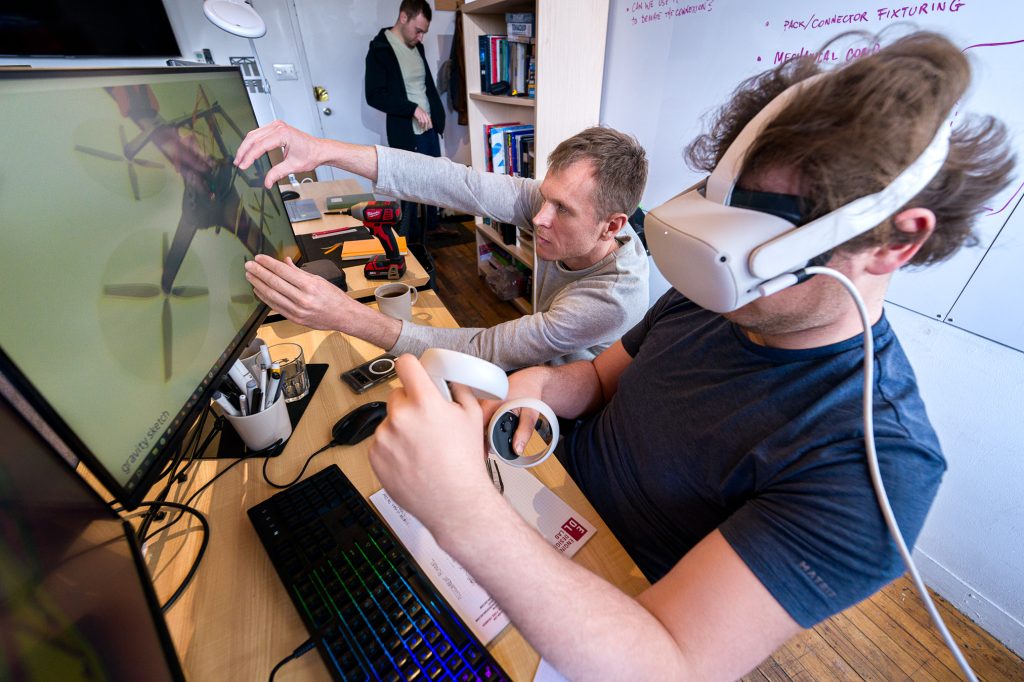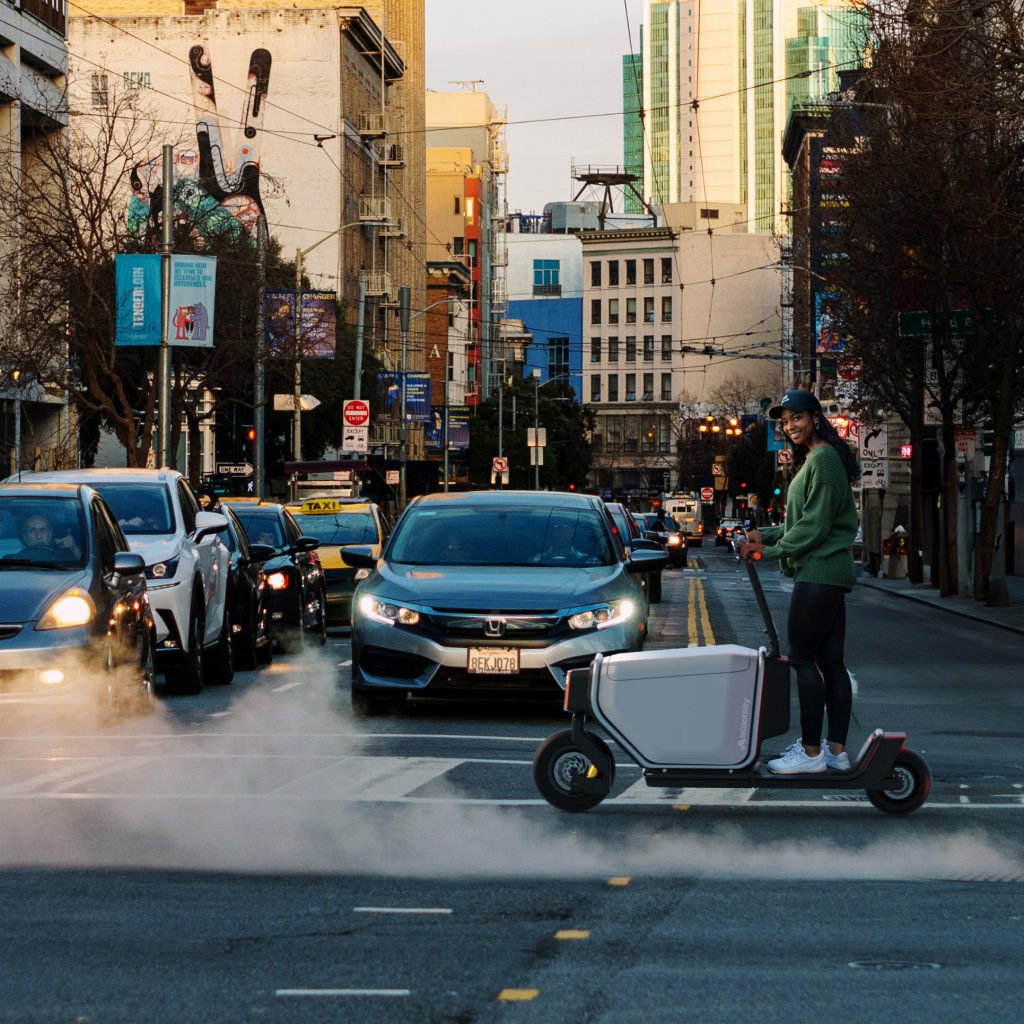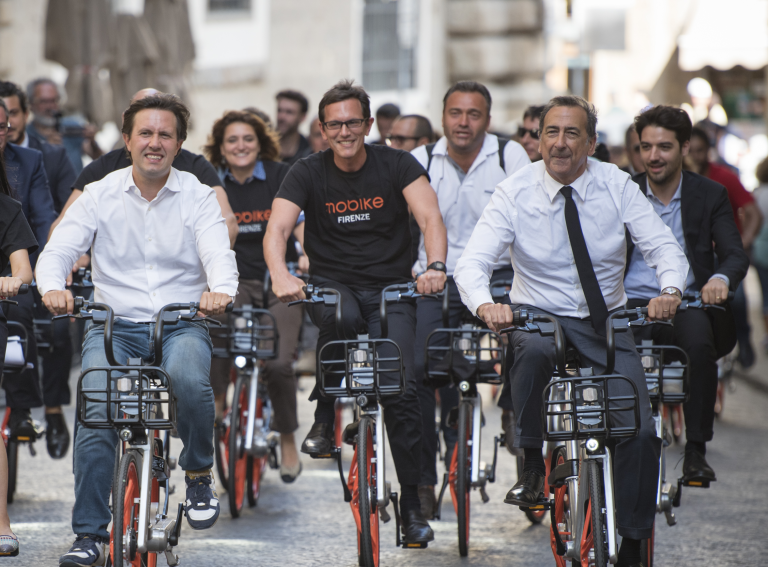Photo credit: Tristan Viney
If you want a steer on what the future of mobility may look like, a good place to start is with Engineering Design Lab (EDL), a Toronto-based company specialising in multi-disciplinary engineering solutions for the micromobility market.
EDL seems to be in on everything from the new utility scooter for last mile delivery, to the innovative AEV “blanc robot” autonomous vehicle – and it was one of the first to use Lithium Ion batteries in a solar electric racing car back in 2001.
Leading this electric switch is CEO and Founder Tomek Bartczak.
“We can build an EV using an off the shelf motor or an off the shelf battery pack, or we can design a battery pack from scratch, design a motor from scratch, so we’re able to operate at a very deep technical level,” he says.
Tomek is an aeronautical engineer by training who felt destined to join the field.
“My parents were both engineers. And I had the largest Lego collection of anybody I knew. So I think it was, you know, part nurture, part nature.”

Solar Racing Across America & Australia
While Tomek was studying at the University of Toronto in 2001, he led an all-volunteer team to construct a solar race car that could clock speeds of up to 100 km/h. Dubbed “Faust”, it showed early on that electric cars were a viable form of transportation. Tomek led the Faust project as Chief Engineer and went on to compete in the American Solar Challenge from Chicago to California, a distance of over 3,550km, on a single battery pack. Faust also competed in the 3,030km World Solar Challenge from Darwin to Adelaide.
What are you most proud of about the Faust? “Just to pull it off,” he says. “I never doubted the technical aspect but the logistics proved very difficult as we needed to raise the funds, rent a facility to build it and this was also before the days of Google so all our outreach was through the phonebook. On finishing my degree, I was excited to put my learnings to good use by developing electric vehicles for mass production.”
After a stint working in the automotive industry, aerospace industry, construction industry and leading research projects in Academia, Tomek decided to set up his own company in order to develop his own ideas about rapid design and innovation.
“The automotive industry just wasn’t very compatible with my personality. I like to be doing all aspects of the work from the design to testing to building. I also started seeing enough of a buzz in the news about EVs and wanted to strike out on my own and run my own company because I knew I could do it.”
Engineering Design Lab was born in 2017 to provide end-to-end engineering expertise and product launch experience.
With a laser focus on urban mobility at the ground level, EDL believes small electric vehicles will play a big role in the future of how we move around cities. Between its employee base and contractors, EDL has Four subject matter experts (SMEs) with PhDs that closely collaborate with the team on a day-to-day basis to provide in-depth expertise on various aspects of EV design, production and certification.
“Many companies have an idea for a product, but lack the full technical expertise or experience to move forward,” says Tomek. “Some don’t know where to start, others try but spend years and countless dollars dealing with false starts, dead ends and expensive lessons learned. We help mobility companies go from idea to reality by the most direct possible path, saving precious time and maximising profitability.”
Serving the Canadian Military
A recent project EDL just completed was to develop a new category of amphibious vehicle for the Canadian Armed Forces.
“We conceptualised, designed, built and tested the logistics vehicle in five months” he says.
This remotely piloted vehicle platform had to cross aggressive terrain, permafrost, sea Ice and water in severe conditions as low as -40 deg C, all while carrying a vehicle or cargo payload.
“Because the project had to be completed in such a short space of time, we thought about what the amphibious vehicle absolutely had to have. And how can we leverage the latest software advancements in EVs? So the vehicle had no steering and no brakes, which you wouldn’t think of as a normal vehicle, right. But because we had four wheel-motors, and we had a complex control algorithm that we developed and tuned throughout the testing period, by differentiating the amount of thrust to each wheel, we were able to steer it just fine. And we were able to use regenerative braking to provide the braking force necessary for the vehicle. That is actually a real selling point for us to the military – if they want to operate this thing in the arctic environment, here’s a vehicle that is super simple. It has got like 10 parts on a platform where almost nothing can go wrong.”
Another project of EDL’s has been to design a fully digital autonomous vehicle platform that can be customised across multiple applications. The so-called ‘Blanc Robot’ is currently being used in the mining industry in Australia.
“The idea behind it was to offer an extremely flexible platform that can be sold to anyone. They could use it for food delivery, or a taxi pod, or for medical supplies. It could then be driverless or remotely piloted.”

Flexibility and Customisation Key for New Mobility
In an industry where many mobility companies are struggling to turn a profit, Tomek believes EDL’s speed, technical expertise and level of customisation are some of its core selling points.
“What we provide is a tightly integrated multidisciplinary engineering solution, which means thinking about things, not just from one standpoint but a lot of different technical ways and understanding the trade offs between them. This is something that I actually learned very early on when developing the solar vehicle. The aerodynamics guys wanted it to be all about aerodynamics, the battery guys wanted it to be all about the battery. The mechanical guys want it to be all about the suspension. And we say, ‘okay let’s think this through, what is actually important?’ We then propose a fully customised solution off the back of that.”
One of the big focus points for EDL this year is Europe and so it has set up shop at Dutch design studio Springtime’s offices in Amsterdam, the same company that has been helping develop the Scootility utility scooter, among other projects.

“I truly believe that there’s tremendous potential to replace larger vehicles with smaller, lighter electric ones and where I see EDL serving this industry is helping startups grow when the margins are pretty tight. We’re not talking about building a $200,000 Ferrari, we’re building a $2,000 scooter or a $5,000 cargo bike. And given that several hardware developers and operators have gone bankrupt in the last couple of years, we’re very cognisant of the fact that you have to be very careful. Our main goal is to leverage our abilities to push this movement forward.”





